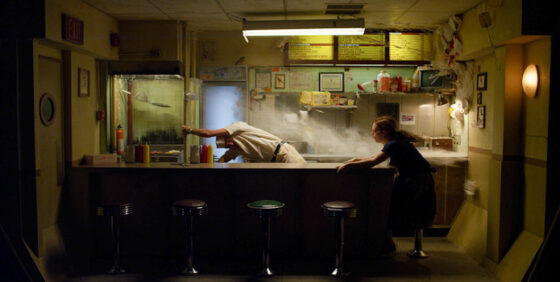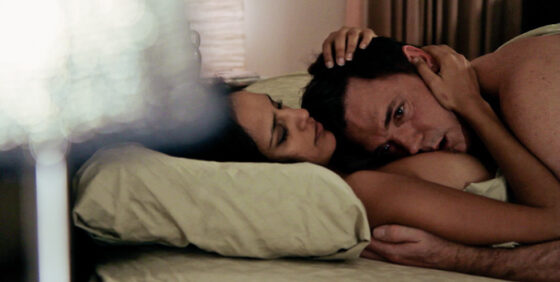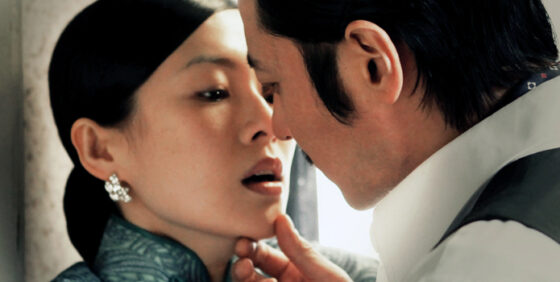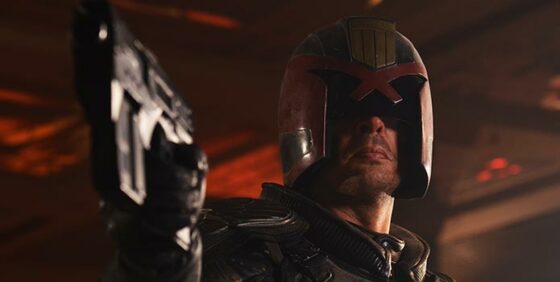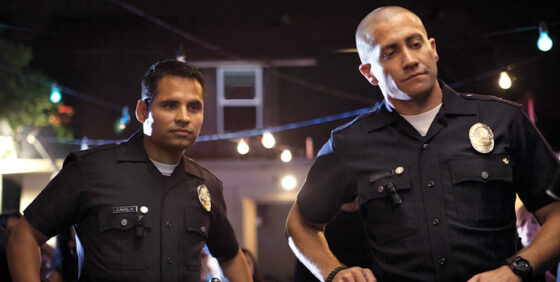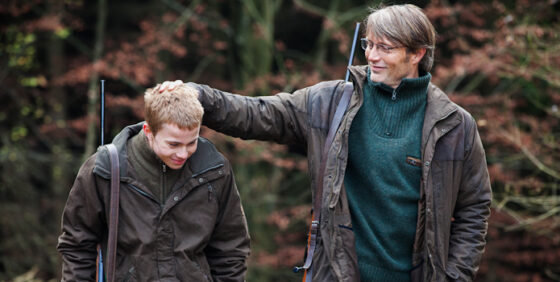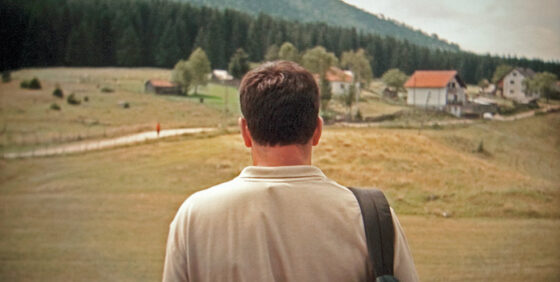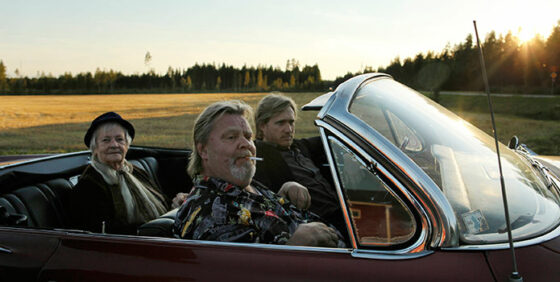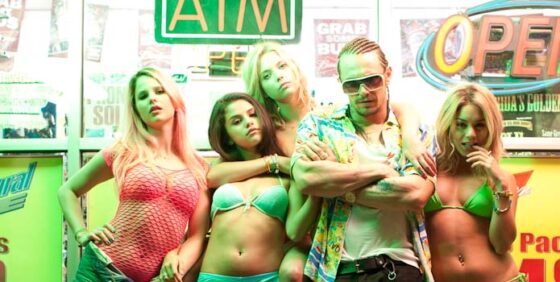TIFF Day 2: Short Cuts Canada | The Crimes of Mike Recket | Dangerous Liaisons | Dredd 3D | Eat Sleep Die | End of Watch | Frances Ha | The Hunt | Krivina | Road North | Spring Breakers | Stories We Tell
Short Cuts Canada
By Hugh Gibson
This year’s Short Cuts Canada section is cast into new light due to two recent developments. First, with the elimination of Canada First (and before it, Perspectives Canada, the so-called “ghettos” for national cinema), it becomes the festival’s sole Canadian-specific program. Second, with the sudden announcement that the Worldwide Shorts Film Festival— North America’s largest shorts-specific festival and marketplace—has been put on hiatus by its parent organization, the Canadian Film Centre, Short Cuts now looms larger as a domestic platform.
Short Cuts is forever destined to dwell in the festival’s proverbial shadows, but it serves a very tangible function, not least of which is that selection unlocks potential Telefilm funding for the (mostly) emerging talent it showcases, thus helping to launch the of gifted young Canadian directors. (Kazik Radwanski is a notable recent example.) As for the films themselves, unsurprisingly the best (and some of the worst) generally comes from Québec. But it strikes me as significant that this year’s best shorts are all directed by women, not only because women remain vastly outnumbered in the directing profession, but also because the program arrives on the heels of the Cannes competition being criticized for its complete dearth of female filmmakers. Regardless, I’m looking forward to seeing eventual features by these directors, wherever they screen:
Barefoot (Danis Goulet). Goulet’s deftly paced story of a teenage girl on a Northern Saskatchewan reserve, who dreams of becoming pregnant, is written and directed with aplomb. Goulet’s understated storytelling, often achieved with unspoken gestures or looks, is beautifully cinematic. Creating a compelling, dramatic universe, Goulet proves herself a talent to watch.
Old Growth (Tess Girard). Girard’s beautifully textured Ontario winter pastoral offers five minutes of contemplative sound and image, and rewards with a richly sensuous experience.
Avec Jeff à moto (Marie-Ève Juste). Juste elicits fine performances in her simple yet resonant story of a Montreal teenager’s hopeful romance with an exciting classmate (hot guy with a motorcycle). Selected for the Cannes Director’s Fortnight, the film is atmospheric, rich with emotion, and made with grace and sensitivity.
La future proche (Sophie Goyette). Goyette displays adept visual storytelling in her tale of an emotionally damaged pilot finding solace in the skies, while reflecting on loneliness and a good deal of urban sprawl.
Faillir (Struggle) (Sophie Dupuis). A Canadian incest story! Nothing new, but Dupuis’ carefully observed drama of young adults in Val-D’Or features daring performances, while the final two scenes are noteworthy for the potent, inventive use of a lingering camera.
As for the rest of the programmes, yes, men made (some good) films too, including A Pretty Funny Story (Evan Morgan), which is pretty hilarious in a Lost Highway meets
Anchorman kind of way. Crackin’ Down Hard (Mike Clattenburg), meanwhile, is fucking hilarious, and probably the best movie shot in Joshua Tree National Park since Twentynine Palms (with which is shares little else in common). The Trailer Park Boys creator offers one of many valuable lessons to be found in Short Cuts, teaching us that “White boys always keep money in their socks.” Deco Dawson’s gleefully kitschy and perverse portrait of artist Jean Benoit, Keep a Modest Head, is amusing, if less impressive than his best work. But it does feature a giant steaming cock, plus indispensable advice on how to escape a fight with a larger, stronger man: simply eat his necktie.
Malody (Phillip Barker) proves that Toronto greasy spoon/landmark Vesta Lunch does look cool upside-down (actually a spinning 360-degree set… apropos of…?), while also demonstrating that a woman covered in gooey pancake mix is an amusing novelty. But even a gooey twirling restaurant must pale against Life Doesn’t Frighten Me (Stephen Dunn), which boasts high school badminton being played in oversized food product costumes. Sadly, the entire film is not the costumed-badminton romp we’ve all been craving, although Gordon Pinsent does, at one point, spoon-feed a pug. Finally, Canoejacked (Jonathan Williams) begs the question: Why was the film not titled Canoe Jack City?
The Crimes of Mike Recket (Bruce Sweeney, Canada)—Contemporary World Cinema
By Michael Sicinski
I try to be a champion of Sweeney inasmuch as I can, because I found so much promise in the dark comedies he produced in the late ’90s and early ’00s. I’d stack Dirty (1998) up against just about anything that came out of Sundance during that era: its frank depiction of sex as an embarrassing cavalcade of failing flesh was ahead of its time in some respects, and wisely abjured any knee-jerk tendency to leaven the discomfort with cutesiness. His next film, Last Wedding (2001), was as engineered for breakthrough as any Tragically Hip album of the period, and has about an equal hit-to-miss ratio; but nevertheless, David Pelletier’s cinematography was sharp and rigourous, the rhythms of the ensemble generally thrumming, and there were a few priceless gags (particularly the reveal of dimwit Zipporah’s country tune, “Love Is Like a Hurr’cane”). But, in the three films following Wedding, Sweeney has seemed intent on capitalizing on all the stuff that pointedly didn’t work there, particularly what we might just have to call plotline and thematics. The Crimes of Mike Recket, sad to say, is an inept, unengaging procedural. Recket (Nicholas Lea) is intended to be enigmatic, but his secret “crimes” are fairly obvious from the get-go. Flat, cheap-looking and tonally inconsistent, Recket spends about a third of its running time following the detectives on Mike’s trail (Raphael Kepinski, Paul Skrudland), whose awkward line readings recall those old Kids in the Hall “Police Department” sketches. Worst of all, the film squanders the great Gabrielle Rose. Neither a successful crime story nor a subversive genre critique, this feels like the work of an auteur adrift.
Dangerous Liaisons (Hur Jin-ho, China)—Gala Presentation
By Tom Charity
Ziyi Zhang follows in the footsteps of Michelle Pfeiffer, Meg Tilly, Reese Witherspoon, Nastassja Kinski and Annette Vadim to play Madame de Tourvel (here Du Yufen), the virtuous woman who becomes the erotic prize in a dacadent game of one-upmanship between the scheming Marquise de Merteuil and cocksman Vicomte de Valmont in this Chinese transposition of the eighteenth century Choderlos de Laclos novel. (There was also a 2003 Korean version, The Scandal, with Jeon Do-yeon.) With Cecelia Chung a standout in the Marquise role and Jang Dong-gun as the over-confident playboy, it makes a seductive enough package to have landed a Gala slot. But this garish, soapy movie is a groaner—at least based on the half-hour I endured in Cannes. Korean director Hur Jin-ho has enjoyed commercial success on home ground with his glossy melodramas (including past TIFF selections April Snow and Happiness), and updating the material to Shanghai in the 1930s looks good on paper, but the crude screenplay by Geling Yan (The Flowers of War) and Hur’s lascivious, leering approach muster all the subtlety of a softcore cable-TV flick. Is it really a critique of the cynicism and inequities of Chinese society in the pre-Mao era, as the TIFF blurb hopefully suggests? Or is it evidence of the cynicism and tepid erotic hopes of today’s Asian film market?
Dredd 3D (Pete Travis, South Africa)—Midnight Madness
By John Semley
For better or worse, Dredd takes the dour, crypto-fascist seriousness of superhero pictures like The Dark Knight Rises (2012) to their logical endpoint, and does so without opportunistically waffling on its Machiavellian realpolitik. This is a film so thoroughly cynical, so nastily and unblinkingly violent, that it’s almost admirable as a bad object par excellence. Almost.
Working out of the Hall of Justice, a skyscraper bedecked with a neon fascist eagle, one-man judicial system Dredd (Karl Urban) and his fellow “judges” patrol the serpentine highways and vertical slums of a Megacity One, a super-metropolis spanning from Washington, D.C. to Boston. The dystopia imagined here hews close to those of Neveldine/Taylor’s Gamer (2009) or Mike Judge’s Idiocracy (2006): a loose network of malls awash with loose trash, clogged by a sweaty, grossly obese populace. Indeed, Dredd is vile enough to be imagined as a film made precisely for the slothful slackjaws that people these other films. To wit: the narcotic du jour is “Slo-Mo,” a glowing inhalant that ramps down the user’s perception of time, allowing Dredd to superficially square it’s Matrix-style “bullet-time” violence with what it passes off as a story. (It also allows Travis to exploit the added dimension, splattering broken glass and blood out into the audience.)
Reporting to a routine triple homicide, Dredd and his mind-reading rookie partner (Olivia Thirlby) wind up barricaded inside a 200-storey apartment block controlled by crime lord and chief Slo-Mo producer Mama (Lena Headey, mutilated and menacing). Evoking, probably incidentally, Gareth Evans’ runaway train of an actioner, The Raid: Redemption (2011), Dredd follows the judge and his trainee as they fight their way up through the complex to reach Mama, dropping wave upon wave of dispensable baddies and attempting to convert the “neutral” residents in a totalitarian riff on Zinnemann’s High Noon (1952).
Dredd seems almost experimentally unpleasant; Travis distinguishes his film from similar man-as-law action films by draining it of any clear satirical impulse. Like its franchise “hero,” Dredd never smirks. (Indeed, Urban wears his face-obstructing helmet for the film’s entirety, annihilating both character and actor’s aspirations of individuation.) Any potential critique here is entirely implicit: Dredd’s pig-state tactics are barely questioned, and even when his partner chides him for mercilessly battering a defenseless, handcuffed suspect, Travis stills invites us to relish the beating.
Dredd makes a monster of morality, offering no point of identification, no escape from its onslaught of exploding faces and hyper-violent overkill. A grand, underlying irony may be presumed, but this could only be a defensive pose against the film’s essential callousness. It is entirely un-fun, and exasperatingly gory. Punishing the bloodlust of its presumed viewer, Dredd asks not only “Where can we go from here?” but also “Why bother?”
Eat Sleep Die (Gabriela Pichler, Sweden)—Discovery
By Adam Cook
Straightforward but undeniably affecting, Eat Sleep Die is an impressive feature film debut from Swedish filmmaker Gabriela Pichler. Following the struggles of Raša, a 20-year-old Balkan girl working in a vegetable-packing factory, the film carefully and effectively depicts the hardships faced by the immigrants who comprise a large percentage of Sweden’s rural working class. Taking a quietly Marxist look at the systematic way the individual is oppressed without taking any ideological shortcuts, Pichler intelligently dramatizes her ideas without imposing a thesis statement. In this way, Pichler comes off as a kind of cousin to the Romanian New Wave, following “unremarkable” characters through social mazes of entrapment.
At the heart of the film is the relationship between Raša and her ailing father, who, despite being plagued with back pain, takes off for Norway for work (only to return in worse shape later). After he leaves, workers start getting laid off at Raša’s factory. In one scene, a man with a clipboard starts approaching employees one by one and giving them the bad news. As he works his way around the factory, Raša grows increasingly nervous, as she fumbles with her task at hand. It’s a tense sequence, where Raša’s fear is palpable, and when she runs away a moment later to escape the inevitable, there is no gap between her emotions and that of the audience. Eat Sleep Die definitively establishes Pichler as a filmmaker to pay attention to: her sincere and devout investment in her characters, and the social conditions that determine their lives, are far beyond the cheap topicality evident in the work of so many festival filmmakers.
End of Watch (David Ayer, USA)—Special Presentation
By John Semley
Above all, End Of Watch is a phenomenological clusterfuck. Opening on a canned title card (no joke: “Once upon a time in South Central…”), then bleeding into a preposterous voiceover on the necessity of law enforcement offered by Jake Gyllenhaal’s bullet-headed LAPD patrolman, David Ayer’s entirely formless shoot-‘em-up goes on to establish a loose verité premise, only to buck it entirely. The set-up is that Gyllenhaal is filming his and his partner’s (the excellent Michael Peña) nightly tours of duty as a project for a community college film course. It’s hard to tell if he’s joking about this—we never see him attend these courses, nor we do we hear of it again. (Though given the ludicrous plot machinations Watch grinds its brassy beat cops through, Gyllenhaal’s would-be David Ayer almost certainly netted an A.)
The found-footage non-idea is quickly dropped. Or rather, it’s absorbed into Roman Vasyanov’s deliriously jittery, and suitably dim, cinematography, presumably to invest Ayer’s latest meat-headed crime drama with an edge of verisimilitude. Like George Romero’s Diary of the Dead (2007), Watch forces reasonable viewers to question exactly how the footage we’re seeing is being presented, and who’s assembling it (never mind why). That End of Watch blows open essential assumptions about the operations of cinematic narration speaks more to its depthless tedium than its aspirations to anything like complexity. Rote in its skittish action sequences, buddy-cop camaraderie, and predictable plotting, not even its stupidity is profound.
Frances Ha (Noah Baumbach, USA)—Special Presentation
By Jay Kuehner
In which the eponymous twentysomething dance instructor, less played by than fully inhabited with gawky charm by Greta Gerwig, emerges from what looks like a New York re-make of Céline et Julie vont en bateau (1974), breaks up with her boyfriend (not a real alcoholic), leaves her roommate and best friend Sophie (works for Random House but doesn’t read), takes up with boys Miles (has photos of himself in the Knicks locker room) and Benji (undateable, working on potential SNL material), gets out of relationship jail, takes a piss on the emergency third rail (the F train isn’t running), can’t account for her bruises, gets a tax refund so dinner is her treat, pirouettes down the sidewalk to a Bowie tune (from what looks like a New York remake of Leos Carax’s Mauvais sang [1986]), blames her narcissism on too many mirrors in her bedroom, loses her job in the dance company’s holiday show and goes to Sacramento for the holidays to see family (gets her teeth cleaned), considers reading Proust, goes to Paris for two days (sleeps through most of it, then goes to see Puss n’ Boots), returns to upstate New York and nature (where you can’t spend money), goes back to college as a camp counsellor, has a Walden Pond moment (Thoreau’s mother apparently lived, like, a few miles away), and is ultimately reunited with Sophie (moved to Japan with her fiancée, blogs about it), choreographs a successful dance show, and finally gets a place of her own (the mailbox bearing her name, just so).
Baumbach’s nominal “departure” sees him shooting in black and white and sharing writing credits with Gerwig, but the emotional terrain mined in his previous work remains constant, albeit redirected toward a demographic closer to hers than his. Frighteningly faithful to a cultural generation for whom sincerity is for suckers, mail comes by phone, and politics are for documentaries, Frances Ha appears as fashionably distracted as its characters, but, much like the core of France’s shambolic, vulnerable personality, there is grace in spades. It plays like a pop record you want to play over and over: imagine Paul McCartney jamming with George Delerue in a Brooklyn basement. This is tits. Ha.
The Hunt (Thomas Vinterberg, Denmark)—Special Presentation
By Mark Peranson
A complete joke of a film, The Hunt is a noxious, single-minded failure that desires to drill home the dangers of groupthink posed by a small Danish community (any Danish community? any community?) that ostracizes one of its beloved citizens (Mads Mikkelsen, Nanni winner at Cannes for Best Actor, and he is good) after he’s falsely accused of showing his willy to one, then all, of the hamlet’s preteens. Because Danish society is corrupt. Every scene is telegraphed, and exists to stack up the odds against poor Mads, who deserves better than this; overnight he’s a serial pedophile. Thomas Vinterberg’s “comeback” amounts to no less than emotional porn, as Vinterberg twists his screws to lead viewers to a sadistic identification with the oppressed Mads, up to the point that we’re supposed to cheer when his hardened shell at last cracks, and he head-butts a Danish oaf in the supermarket (one that, quite implausibly, tried to ban him from its premises, even after he has been cleared of all charges). But maybe the last straw was the killing of his dog. About the only calamity that does not befall poor Mads is anal rape, though maybe Vinterberg left that on the cutting-room floor, as we never do see what happens to Mads when he’s in prison awaiting trial. There’s a fine line between depicting injustice and perpetrating it—Don Siegel, for one, knew how to walk this tightrope; Vinterberg should just quit before he does more damage. I’d rather watch a rerun of Law and Order SVU.
Krivina (Igor Drljaca, Canada/Bosnia-Herzogovina)—Discovery
By John Semley
Like Ingrid Veninger or Kazik Radwanski, Igor Drljaca belongs to the new school of micro-budget Toronto indies. Elsewhere termed “humblecore,” the smallness of these films is often a virtue in and of itself, though by no means the defining one. Drljaca’s feature debut at once endears and distinguishes him from this lot: his aesthetic is more mannered than Radwanski’s, favouring simple compositions and fixed cameras to skittish, post-Dardennes realism. Yet the filmmakers share a preoccupation with the inner lives of individuals and, as in Veninger’s Modra (2010), a focus on the European-Canadian diaspora, though Drljaca’s subject is decidedly less cheery than Veninger’s affecting coming-of-age family affair.
The Bosnian War of Independence rings through Krivina, steely and spiked like the aftershock of a grenade blast. Miro (Goran Slavkovic) a former Yugoslavian now living in Toronto, never seems to linger anywhere for very long, moving from Yugoslavia to Montreal to Toronto, and then to Toronto again. There’s no mention of where he was in between Hogtown stints. Instead, Drljaca’s chronological scrambling captures him where he really is: adrift between his now non-existent home country, his Canadian port of call, and the memories that remain in the sleepy Bosnian countryside. Miro hears that an old friend of his, rumored to have resurfaced back east, is wanted for war profiteering. So he leaves his construction job and heads home to investigate, piecing together sightings, clues, and hearsay from the locals.
Both emotionally and aesthetically, Krivina exists at the knotty intersection of these stories and scraps of information. Drljaca constantly upsets expectations, with monologues pointing in random directions, and characters introduced only to be dropped (or even more weirdly, to cross into the next scene after they’ve exhausted their ostensible narrative function). It all drives the atmosphere of surreal mystery that washes over the film, as much an analogy for Miro’s unreliable feelings and memories as the Sarajevo-born Drljaca’s own relationship to the traumas of the Bosnian War. The eerie reveal of Krivina’s final shot is stunning and tough to read, but while it would be easy to write it off as another of the film’s peculiar red herrings, there’s a palpable sense that Drljaca is truly conjuring up fractured psychological landscapes.
Road North (Mika Kaurismäki, Finland)—Contemporary World Cinema
By Curtis Woloschuck
Mika Kaurismäki has often employed novel approaches when tackling male bonding, be it leaving his leads to improvise in Three Wise Men (2008) or tailing Sam Fuller and Jim Jarmusch to Brazil in Tigrero: A Film That Was Never Made (1994). Regrettably, on this occasion he’s settled for helming a standard-issue road movie, the likes of which we’ve seen countless times before. This means that the writer-director’s first order of business is pairing up some predictably mismatched leads. Tightly-wound concert pianist Timo (Samuli Edelmann), returns home to discover Leo (Vesa-Matti Loiri), the slovenly father who abandoned him 30 years earlier, passed out on his doorstop. After stealing a car and pulling a hold-up, Leo convinces Timo (who’s unaware of Dad’s criminal inclinations) to ride shotgun with him to Lapland, where a mysterious inheritance awaits.
Timo’s ready compliance might be less irksome if the ensuing journey offered up more significant rewards. Unfortunately, a rather middling standard for both drama and comedy is established with an early call to the home of Miko’s half-sister Minna (Mari Perankoski). Just as the reunions and reconciliations lack any sense of tension, the attempts at humour—e.g., Minna’s amorous husband, who hits on both Timo and Leo—prove strained. Granted, there are superior roadside attractions that await. (For instance, an impromptu father/son performance in a hotel lounge will understandably be cited as a highlight by the film’s champions.) However, once you’ve attuned yourself to the odd rhythms that drive this odyssey, arriving at its telegraphed climax proves to be a bit of a haul.
Spring Breakers (Harmony Kormine, USA)—Special Presentation
By Mark Peranson
First things first: despite the presence of Selena Gomez and the blonde Disney Channel twins, Spring Breakers is not a commercial film: it is hardcore art house. It’s not even Harmony Korine’s most commercial film, though maybe the many industry experts who have so opined associate boobies with commercialism. Nor is it at all revolutionary. Many things pop out of Spring Breakers along with those boobies, but first and foremost this is Harmony Korine doing late Hou Hsiao-hsien (say, Millennium Mambo and Flowers of Shanghai) via Miami Vice (the TV show and the movie) and Girls Gone Wild (the DVD and the downloadable internet version), and it’s as intriguing but also as problematic as that sounds. The structure is also right of out The Wizard of Oz, or I should say, thanks to the omnipresent vulgarity, Wild at Heart, as Korine’s four DTF heroine escape the glumness of small-town reality by robbing a Chicken Shack, bussing it to Florida, partying hearty, being arrested for drug possession, and eventually entering the last circle of hell when bailed out of jail by James Franco’s Scarface-adoring gangsta, a drug-dealing reprobate named Alien, who here substitutes for Bobby Peru. (Franco, I must admit, is pretty good.)
The better to illustrate the horrific American (and Canadian too) ritual that takes place each March in South Florida, Korine has created a time vacuum of “Spring break forever,” or a video game with a pounding soundtrack that is set on replay, overemploying formal strategies like repetition of lines of dialogue in pseudo-Malickian voiceover and interchangeable high-gloss, slo-mo montages of coke being snorted off tits, beer funnelling, and lipstick lesbianism (the last provided the most hilarious Venice moment, as the Italian subtitler translated “Bitches all up on each other” as “Amore lesbico”). But something nagged at me throughout Spring Breakers, a mind-numbing film that mostly feels assembled rather than directed, and only later did I realize that it’s the clear influence on Korine of fellow amoral moralist Gaspar Noé (courtesy of his DP Benoît Debie), which is made explicit in the last shot—when the world finally literally turns upside down—and present as a snake in the grass throughout. Yet Korine is clearly a more intelligent filmmaker than Noé, as this barely scratches the surface as to what’s going on in Spring Breakers, a contemporary work that’s as American as apple pie, or a red, white and blue popsicle being fellated, but a film that also afforded me very little pleasure and gave me a headache; kind of like spring break, I suppose. Spring break forever. Spring break forever.
Stories We Tell (Sarah Polley, Canada)—Special Presentation
By Angelo Muredda
Sarah Polley’s announcement earlier this year that she was working on an adaptation of Margaret Atwood’s puzzle-box Alias Grace was a curious one, so tonally at odds is the book with Polley’s largely straightforward directorial work so far. Stories We Tell is a bold stepping stone in that more opaque direction, not just because it opens with a passage from Atwood’s novel that likens being in the middle of a story to “a dark roaring, a blindness.” The story here is an affecting but tricky portrait, in absentia, of Polley’s enigmatic mother Diane, who haunts the film in both Super-8 home movies and dramatic reenactments of them. Those reconstructions are roughly implemented at times, with an awkward assist by the homely ragtime on the soundtrack, but they’re a strong distancing effect nonetheless, making us wonder whether someone else’s family albums ought to be so easy to parse. Ownership, more than memory, is the subject here, and at its best the film is a candid study of how everyone, including the director, stakes heartbreaking and often dubious personal claims to family baggage. At one point a key player who’s skeptical about the project charges that opening the story up to other people would be a democratic lie. Polley disagrees, and while it’s her method of communal storytelling by crowd-sourcing that’s ultimately privileged, there’s an ambivalent and even steely sort of generosity to how she lets his objection, a critique of her right to even make this film, stand.
cscope2
- « Previous
- 1
- 2

